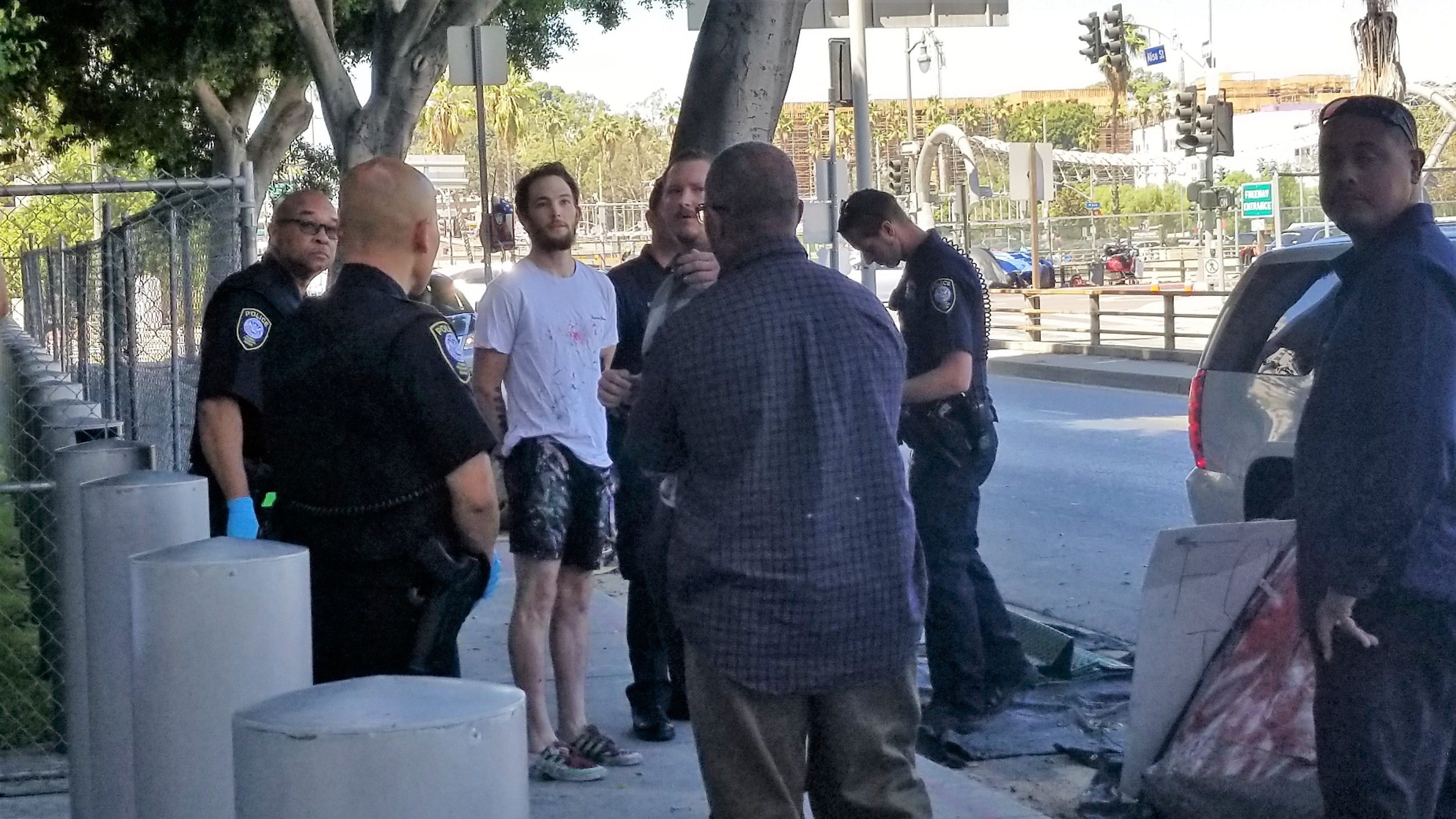[dropcap size=big]T[/dropcap]he first signal came with the uniformed federal officers and plainclothes agents. They surrounded the beat-up camping tent on the sidewalk outside the Metropolitan Detention Center in downtown Los Angeles Friday afternoon, and prepared to make an arrest.
A federal police vehicle was parked next to the sidewalk and agents demanded the inhabitant come out. There was a pause, and a voice spoke back but was lost in the sound of the nearby freeway traffic.
Slowly the zipper opened from the inside of the tent and a man stepped out in shorts and a white shirt. He was barefoot. Frederick Murphy was immediately arrested by the officers who patted him down with blue nylon gloves. They handcuffed him as they announced — loudly — that they held a warrant for his arrest.
One observer held up a phone and asked the uniformed officers why Murphy was being taken away, but none of them answered.
Murphy’s arrest was the fifth at the camp in the previous days, according to organizers and to police. With law enforcement upon it, the camp against the separation of families at the border is believed to be on its last days. Friday, September 14, was its 85th.
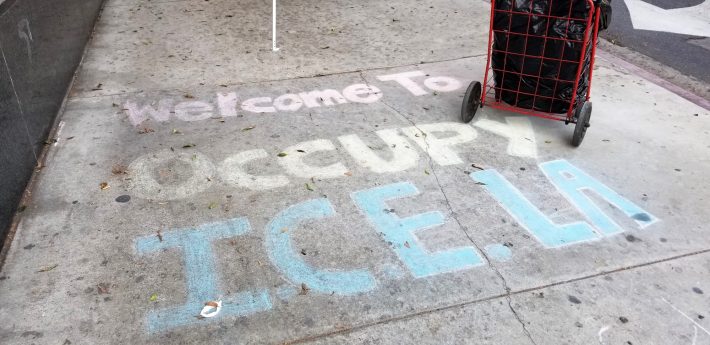
[dropcap size=big]F[/dropcap]or nearly three months, protestors have camped outside the jail to call attention to the Trump administration’s policy of family separation and the actions of the U.S. Immigration and Customs Enforcement (ICE) and the Department of Homeland Security (DHS).
From an estimated 2,600 children separated from their families as of earlier this year, 400 children remain separated from their parents and in federal custody despite a federal judge’s order, according to the American Civil Liberties Union.
Occupy ICE camps sprouted across the country in June when news of the federal government’s family separation policy captured national attention, but have since dwindled down. Protestors said the Metropolitan Detention Center operates as a processing center for ICE as the agency conduct immigration sweeps across Los Angeles. They were able to hold multiple Sheriff’s Department buses from entering the facility in several incidents across months.
But the energy at the Occupy ICE L.A. camp has dissipated in recent weeks. Organizers at the camp say there has been a decline in the number of people willing to sleep overnight.
Maintaining a constant presence at the camp site has been challenging. People come and go. The first wave of protestors who set up in late June have since rotated out, with only a few remaining at the site in September.
On Tuesday, more than a dozen people called a press conference and then blocked several driveways at the jail. But on Friday there were only three people left after Murphy was taken away.
Now, there was a divide — stay or go?
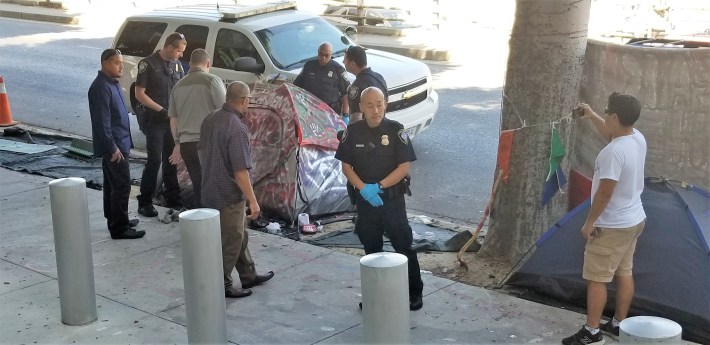
[dropcap size=big]T[/dropcap]he plain-clothes agent told L.A. Taco that Murphy was being arrested because of an incident that took place at the Occupy ICE camp, but he did not give his name and said a spokesperson from the Department of Homeland Security would need to answer any other questions.
Earlier in the week, Murphy told L.A. Taco that a man had approached him on Wednesday with a phone and stuck it in his face to take a picture.
“At first I didn’t think he was an agent, so I popped off on him,” said Murphy. “I said ‘If you do that again – if you violate my personal space again I’ll slit your fucking throat.’ I guess DHS was waiting for me to slip up physically or say something.”
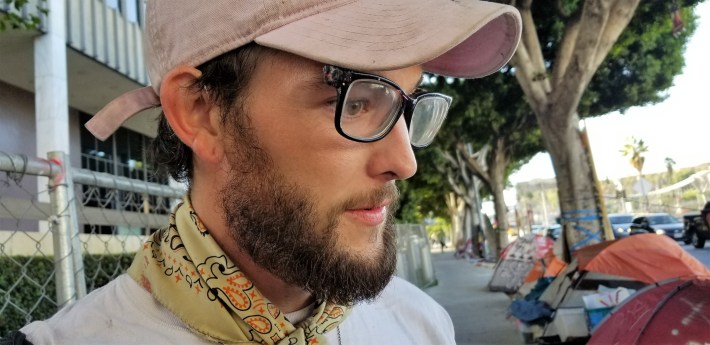
Murphy said he was arrested for making terrorist threats against a federal agent and that while being arrested he was thrown against a wall by officers. His glasses broke. Agents interrogated Murphy, but eventually he was released later that afternoon, according to his recollection of events.
After he was released, Murphy was adamant that he would return to the camp. “Until the children get to be with their parents,” Murphy said. “If that’s how long it takes then – I know that it’s the right thing to do.”
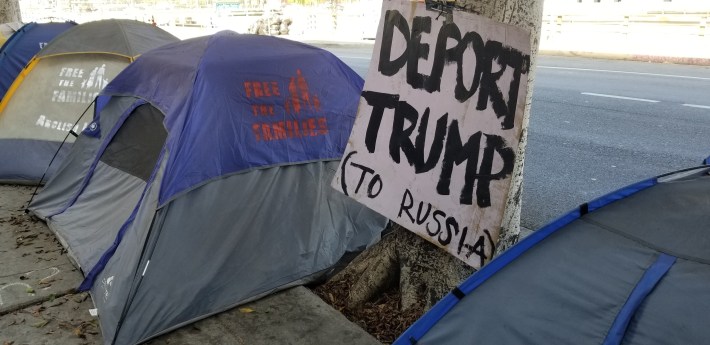
[dropcap size=big]S[/dropcap]eventy-year-old Mercedes Moreno sat among the tents early last week. She told L.A. Taco that she’s a frequent visitor of the camp and supports what the Occupy ICE L.A. advocates are doing.
“Because when my son came here to the US for the first time he was only 13-years-old,” said Moreno, who arrived from El Salvador years before. “I didn’t know he was picked up by Immigration and Naturalization Service until a lawyer contacted me.”
At 18, her son Jose Leonides Moreno was deported back to El Salvador, where he faced trouble with the Salvadoran government, Moreno recalled. "They tortured him."
“He tried to make his way back here in 1991, but since that year I never saw my son," she explained. "This is why I’m here. For the little boys, for the little girls that are kept in jails.”
Moreno said she can only visit the camp during the day, but sees the importance all the same.
An investigation by the New York Times last week revealed a record-setting total of 12,800 children currently being detained by the Trump administration.
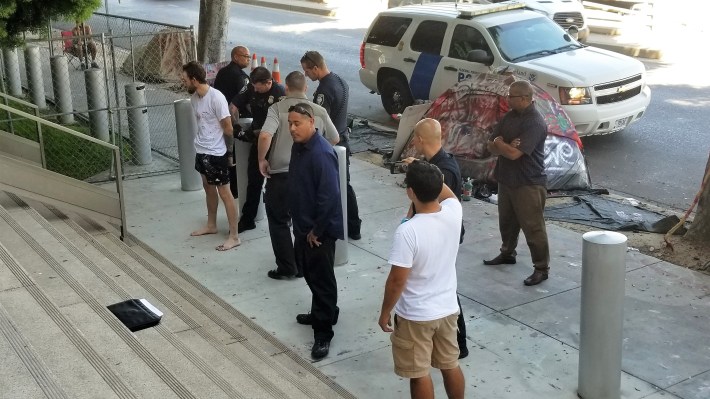
[dropcap size=big]O[/dropcap]rganizer Marco Flores said the group’s energy could better be focused in other protests and actions. There is doubt among the few remaining regulars at the camp if they will stay. On Friday, Flores took down a tent and cleared out a few tables from the sidewalk.
“There has been no consensus on what to do,” Flores said shortly before Murphy's Friday arrest. “I’m done with the site.”
An email sent to the Department of Homeland Security for questions related to Murphy’s arrests was not answered.
During the Friday arrest, Murphy’s jewelry — some strings and charms on his wrists — were carefully removed by an officer and passed off to someone at the camp. He was placed in the backseat of the white police vehicle and the officers shook hands after they carefully removed their gloves.
One plain-clothes agent grabbed a uniformed officer by the shoulder and said, “Let me get you a coffee.”
Shortly after that, the rest of the beat-up tents appeared empty.
